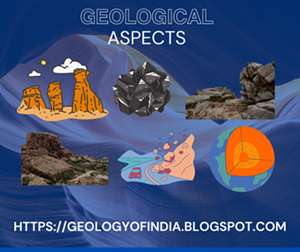Geological aspects refer to various elements and features related to the Earth's structure, composition, and processes.
Geology is the scientific study of the Earth's physical properties, including its rocks, minerals, land forms, and the processes that shape the planet's surface and interior.
Here are some key geological aspects:
1. Rock Types: Geology involves the classification and study of different types of rocks, such as igneous - formed from molten material, sedimentary -formed from the accumulation of sediments, and metamorphic - rocks that have undergone changes due to heat and pressure.
2. Plate Tectonics: The theory of plate tectonics explains the movement of Earth's lithospheric plates, which leads to the creation of mountain ranges, earthquakes, and the formation of ocean basins.
3. Earth's Interior: Geologists study the Earth's internal structure, including the core, mantle, and crust. The composition and properties of these layers are essential in understanding the planet's geology.
4. Land forms: Geological processes shape the Earth's surface features, including mountains, valleys, canyons, plateaus, and plains. These land forms are the result of various geological forces and erosion.
5. Minerals: Geology involves the identification and classification of minerals, which are naturally occurring inorganic substances with specific chemical compositions and crystal structures.
6. Fossils and Palaeontology: The study of fossils and palaeontology is a significant aspect of geology. It helps us understand the history of life on Earth and how species have evolved over time.
7. Geological Time Scale: Geologists use the geological time scale to categorize and date events in Earth's history, including the age of rocks, the appearance and extinction of species, and major geological events.
8. Natural Hazards: Understanding geological processes is crucial for assessing and mitigating natural hazards such as earthquakes, volcanic eruptions, landslides, and tsunamis.
9. Water Resources: Geology plays a role in the study of groundwater and surface water, which is vital for managing water resources, including aquifer mapping, well drilling, and water quality assessment.
10. Energy Resources: Geologists are involved in the exploration and extraction of energy resources, including fossil fuels (oil, gas, coal) and renewable resources (geothermal, wind, and solar energy).
11. Environmental Geology: Geologists also contribute to environmental science by studying the impact of human activities on the Earth's geology, including issues like soil erosion, contamination, and land use planning.
12. Geo hazards and Risk Assessment: Geologists assess the potential risks associated with geological events and phenomena and provide guidance for land use planning, construction, and disaster preparedness.
Geological aspects play a crucial role in understanding the Earth's past, present, and future. They have applications in various fields, including natural resource management, environmental protection, and the study of Earth's history and evolution.
Get Information about Career In Geology
Visit Official Home Page






0 Comments